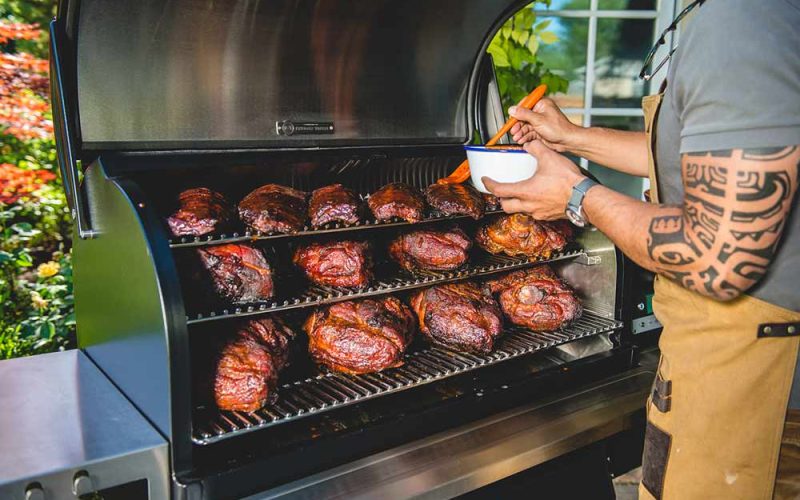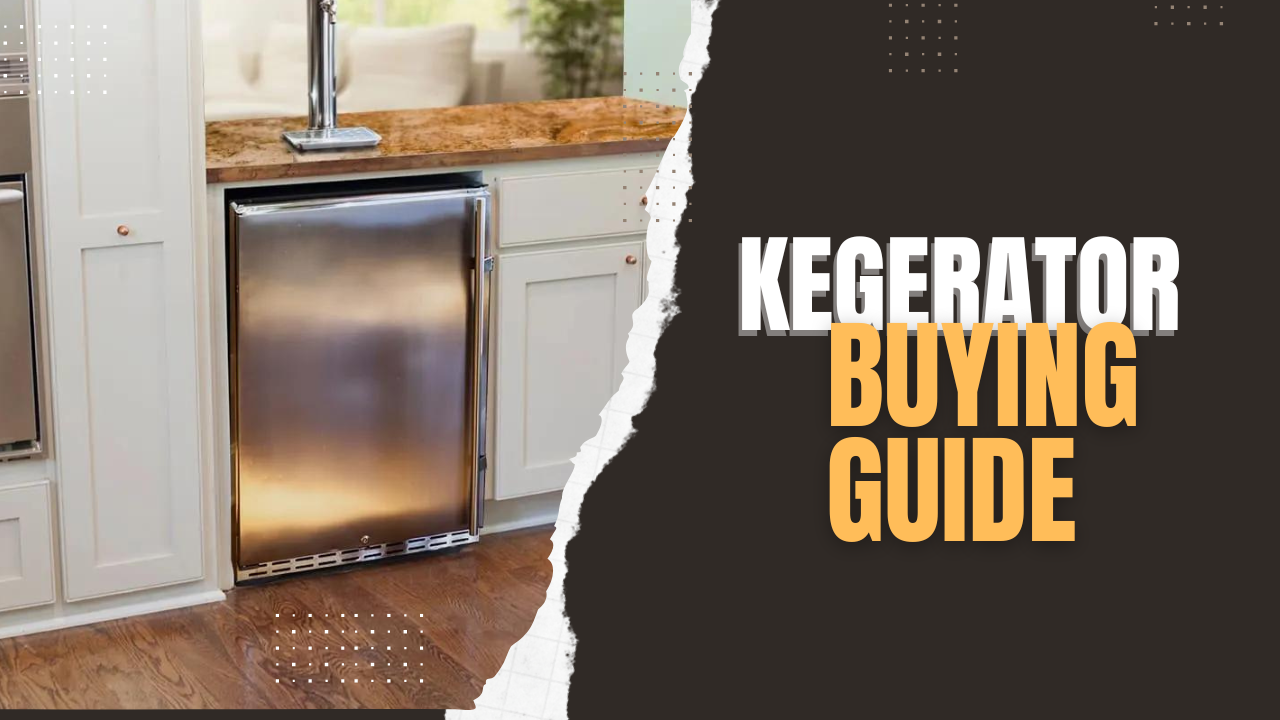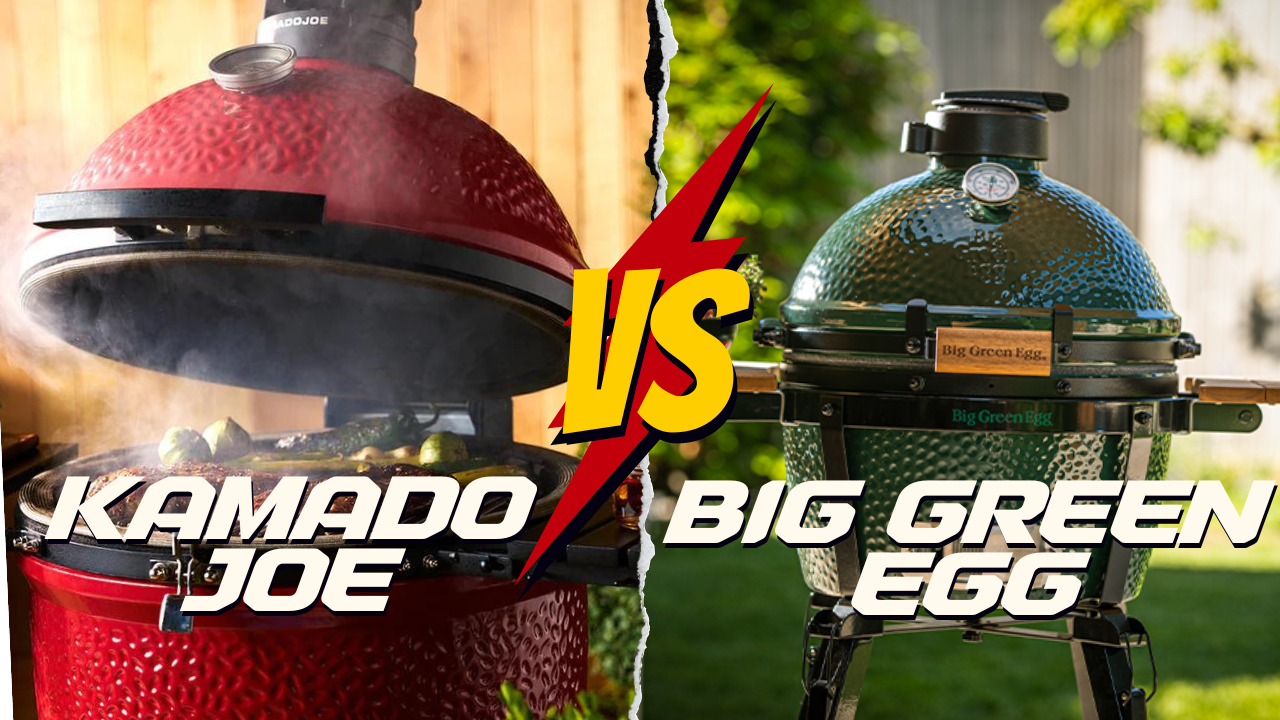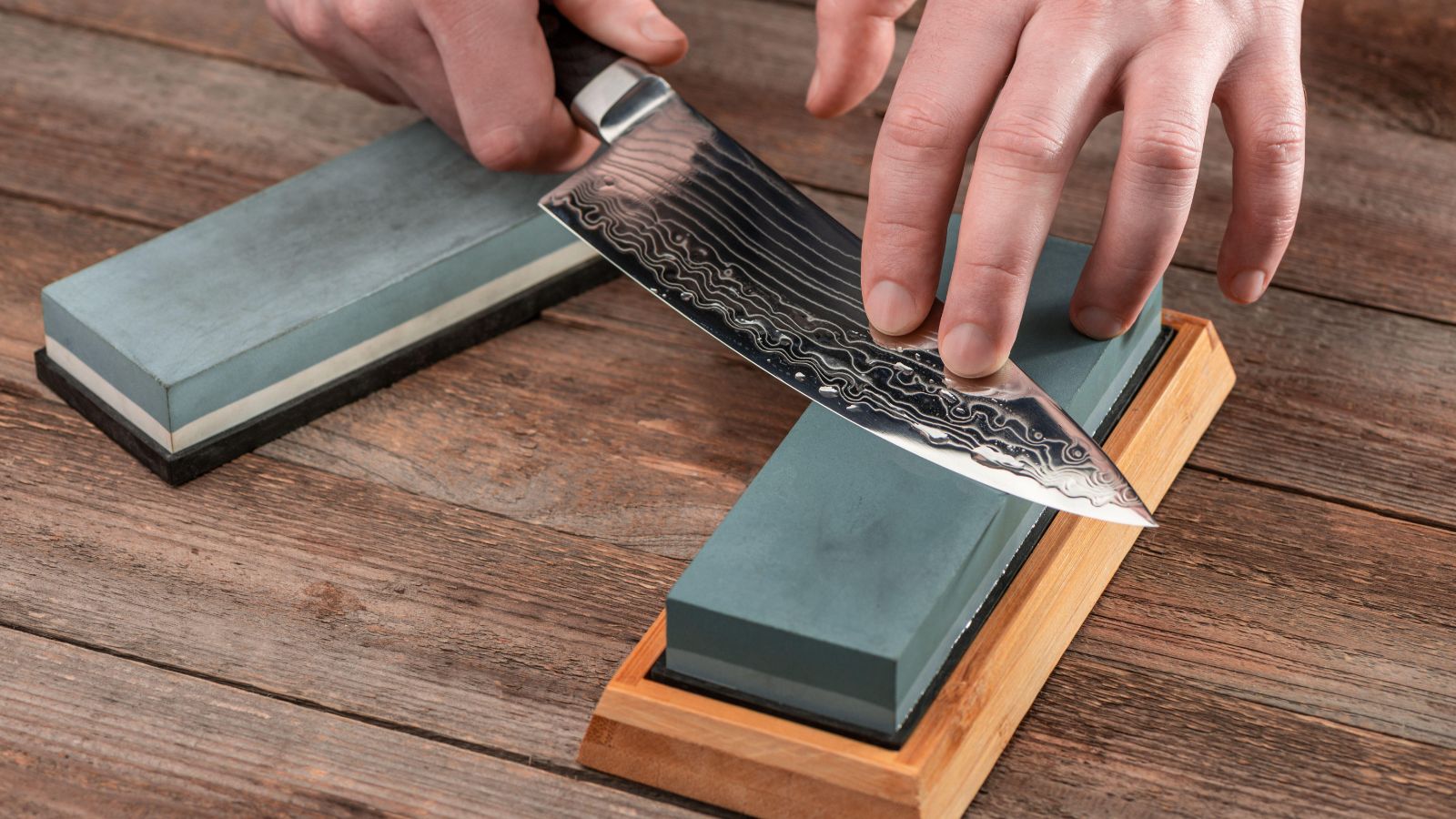When it comes to choosing the right grill for your outdoor cooking escapades, a pellet grill can be a fantastic option. Known for their versatility and convenience, pellet grills have taken the BBQ world by storm. To make your decision easier, we’ve created a comprehensive pellet grill comparison chart that covers various aspects of these grills, helping you understand what makes one model different from another. From the size of the cooking space to the precision of temperature control, and from pellet consumption to the reliability of various manufacturers, we’ll delve into all these aspects to guide you in making an informed choice.
Charcoal Grill vs. Pellet Grill: The Smoky Showdown
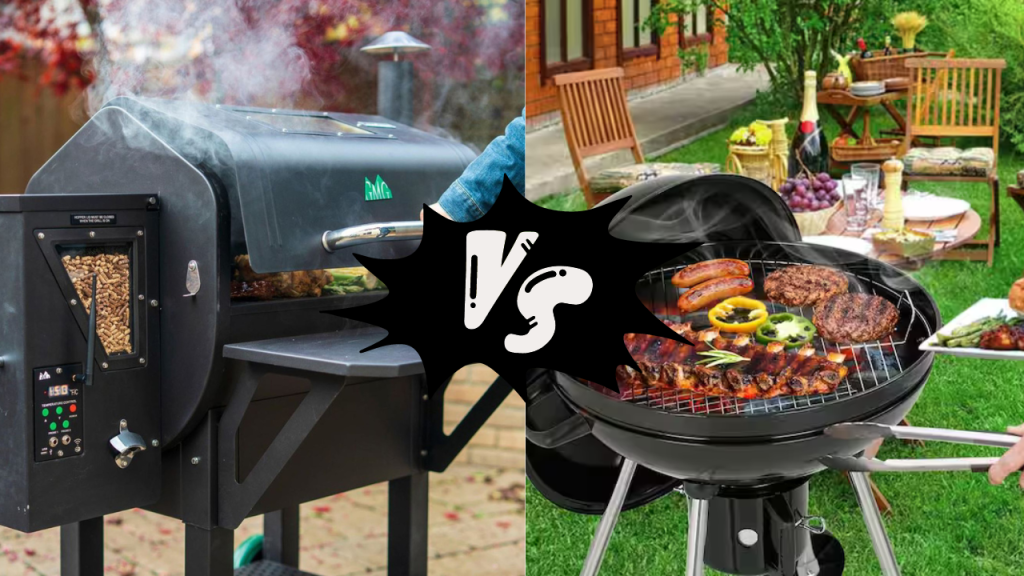
When it comes to the world of outdoor cooking, the battle between charcoal grills and pellet grills has been raging for years. Both types of grills have their loyal followers and unique benefits, and in this section of our comprehensive pellet grill comparison chart, we’ll stage a smoky showdown between these two grill titans. We’ll delve into the benefits of each and provide a detailed comparison, helping you make the best choice for your grilling needs.
Benefits of a Charcoal Grill:
- Authentic Smoky Flavor: Charcoal grills are renowned for imparting an authentic smoky flavor to your food. The smokiness comes from the charcoal and wood chips or chunks you use for grilling.
- High Temperatures: Charcoal grills can reach extremely high temperatures, making them ideal for searing steaks and achieving that coveted caramelized crust on meats.
- Direct and Indirect Cooking: Charcoal grills offer the flexibility of both direct grilling (cooking directly over the coals) and indirect grilling (cooking alongside the coals), allowing you to prepare a wide variety of dishes.
- No Electricity Required: Charcoal grills don’t rely on electricity, making them suitable for outdoor cooking even in remote locations.
Benefits of a Pellet Grill:
- Wood-Fired Flavor: Pellet grills provide the beloved wood-fired flavor, allowing you to choose from various wood pellet flavors to customize the taste of your dishes.
- Precise Temperature Control: Pellet grills offer precise temperature control, allowing you to set your desired cooking temperature and maintain it throughout the entire grilling process.
- Versatility: Pellet grills are incredibly versatile, offering a wide range of cooking options, from smoking and roasting to grilling, baking, and searing, all on a single grill.
- Efficiency: Many pellet grills are designed for efficient pellet consumption, ensuring you get the most out of your pellets and reducing the need for frequent refills.
Comparing Charcoal Grills to Pellet Grills:
In this showdown, we’ll weigh the pros and cons of charcoal grills against pellet grills to help you determine which grill aligns better with your grilling style and preferences:
- Flavor: Charcoal grills excel in providing authentic smoky flavor, but pellet grills offer a wood-fired taste that can be tailored by choosing different wood pellet flavors.
- Temperature Control: Pellet grills are the champions of precise temperature control, while charcoal grills require you to master the art of airflow and coal arrangement to control temperature.
- Versatility: Pellet grills offer a broader range of cooking options, making them suitable for various culinary applications, whereas charcoal grills are versatile but require more manual intervention for temperature adjustment.
- Start-Up Time: Charcoal grills have a quick start-up time, allowing you to start grilling within minutes, while pellet grills require a longer preheat time.
- Cleanup: Charcoal grills often leave behind ash and require more post-cooking cleanup, while pellet grills generate fewer ashes and are easier to clean.
- Fuel Convenience: Charcoal grills rely on charcoal and wood, which may require frequent replenishing, while pellet grills use compressed wood pellets, offering longer cooking times with less pellet management.
- Searing Ability: Charcoal grills are better at achieving high temperatures for searing, making them ideal for certain grilling techniques, while pellet grills can sear but might require additional accessories.
- Smoke Control: Charcoal grills offer less control over smoke production, while pellet grills allow you to fine-tune the smoke level for different dishes.
Comparing Cooking Space in Pellet Grills:
Different pellet grills offer varying sizes of cooking space, typically measured in square inches. In this comparison, we’ll discuss the cooking space of popular pellet grill models, highlighting their specifications and how they compare to one another.
- Traeger Pro 575: Traeger’s Pro 575 offers a cooking area of 575 square inches, making it a suitable choice for small to medium-sized gatherings. It’s a versatile grill, but it may feel limited when hosting larger events.
- Green Mountain Grill Davy Crockett: This portable pellet grill provides 219 square inches of cooking space. While it’s perfect for on-the-go grilling, it’s not the best choice for large gatherings.
- Pit Boss Austin XL: The Austin XL boasts an impressive 1,000 square inches of cooking space. It’s a top choice for those who frequently host BBQ parties and need plenty of room for various dishes.
- REC TEC Grills Stampede: The Stampede offers 592 square inches of cooking space, striking a balance between versatility and size. It’s suitable for both family dinners and entertaining guests.
- Weber SmokeFire EX4: Weber’s SmokeFire EX4 provides 672 square inches of cooking space, making it a well-rounded choice for those who appreciate Weber’s quality and brand reputation.
Pit Boss: Affordable Quality in the World of Pellet Grills
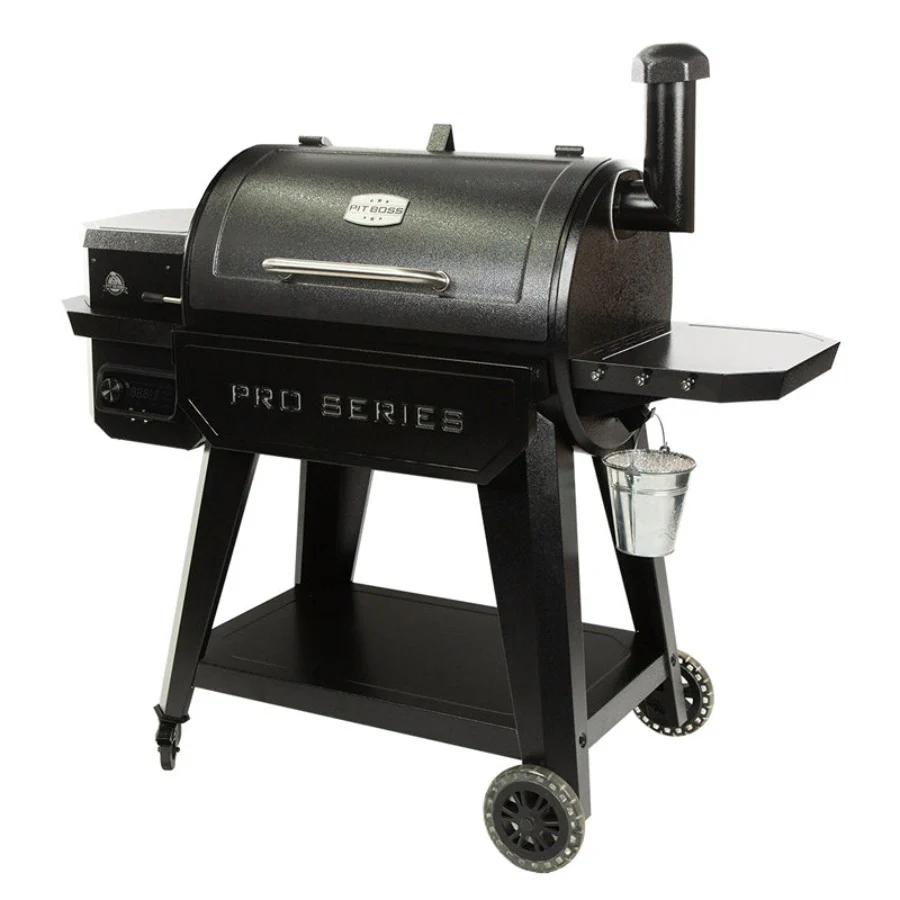
Pit Boss is a well-known name in the world of pellet grills. In this section of our comprehensive pellet grill comparison chart, we will delve into the Pit Boss brand, exploring the benefits and unique features it offers. We’ll also compare Pit Boss grills to other popular brands, helping you make an informed decision when selecting your next pellet grill.
Benefits of Choosing Pit Boss:
- Affordability: Pit Boss is often recognized for providing quality pellet grills at an affordable price point. This is a significant advantage for those who want to enjoy the benefits of a pellet grill without breaking the bank.
- Quality Construction: Despite their affordability, Pit Boss grills are well-constructed and durable. They are designed to withstand the rigors of outdoor cooking, ensuring a long-lasting investment.
- Advanced Features: Many Pit Boss models come with advanced features such as digital temperature control, ample cooking space, and the ability to smoke, grill, bake, roast, sear, and braise. This versatility makes Pit Boss grills suitable for a wide range of culinary applications.
- Warranty: Pit Boss offers a competitive warranty, providing peace of mind to customers. This shows their commitment to standing behind their products and ensuring customer satisfaction.
Comparing Pit Boss to Other Brands:
To help you make an informed decision, we’ll compare Pit Boss to other prominent pellet grill brands, such as Traeger and Green Mountain Grill, in terms of key features, pricing, and customer satisfaction.
Pit Boss vs. Traeger:
- Pricing: Pit Boss grills are generally more affordable than Traeger grills with similar features, making them a budget-friendly option for those seeking quality without a high price tag.
- Temperature Control: Both Pit Boss and Traeger offer precise temperature control, ensuring consistent cooking results. However, some users prefer the user-friendly interface of Pit Boss grills.
- Cooking Area: Pit Boss grills often provide a larger cooking area for the price, which is advantageous if you regularly cook for a crowd.
- Customer Satisfaction: Pit Boss has garnered a dedicated following among users who appreciate the combination of affordability and quality. Traeger, on the other hand, is known for its brand reputation and longevity in the industry.
Pit Boss vs. Green Mountain Grill:
- Affordability: Pit Boss grills are typically more affordable than Green Mountain Grills, which can be appealing for budget-conscious consumers.
- Versatility: Both Pit Boss and Green Mountain Grill offer versatile cooking options. However, Pit Boss models often come with more extensive cooking areas and lower price points.
- Customer Reviews: Customer reviews for Pit Boss grills frequently highlight their value for money and performance. Green Mountain Grill, on the other hand, appeals to those who prioritize portability and quality.
In summary, Pit Boss stands out in the world of pellet grills as a brand that offers affordable quality and a range of advanced features. When comparing Pit Boss to other brands, it’s essential to consider your specific cooking needs and budget to determine which grill aligns with your preferences.
Pellet Consumption: Efficiency Matters
Pellet consumption is a significant concern for many pellet grill owners. A more efficient grill will not only save you money on pellets but also ensure that your grill maintains consistent temperatures throughout the cooking process. In this section of our pellet grill comparison chart, we will explore the importance of pellet consumption and how it affects your overall grilling experience. We’ll also provide a comparison of different pellet grills based on their efficiency.
Benefits of Efficient Pellet Consumption:
- Cost Savings: Efficient pellet consumption means you use fewer pellets per cooking session, resulting in cost savings over time.
- Consistency: A grill that uses pellets efficiently maintains consistent heat, reducing the risk of temperature fluctuations that can affect the quality of your dishes.
- Eco-Friendly: Using fewer pellets is not only economical but also environmentally friendly, as it reduces the carbon footprint associated with pellet production and transportation.
- Less Refilling: With efficient pellet consumption, you won’t need to refill the pellet hopper as frequently during long cooking sessions, enhancing convenience.
- Extended Cook Times: An efficient grill can provide longer cook times with the same amount of pellets, making it ideal for smoking large cuts of meat.
Comparing Pellet Consumption in Different Pellet Grills:
Different pellet grills have varying levels of pellet consumption due to differences in design, temperature control systems, and insulation. In this comparison, we’ll discuss the pellet consumption of popular pellet grill models, giving you insight into which grills are known for their efficient use of pellets.
- Pit Boss Austin XL: The Pit Boss Austin XL is known for its efficient pellet consumption, thanks to its well-insulated design and precise temperature control. Users often report long cook times with minimal pellet refilling.
- Traeger Pro 575: Traeger’s Pro 575 is also praised for its efficient pellet consumption, with many users achieving consistent cooking results while using fewer pellets.
- REC TEC Grills Stampede: The Stampede from REC TEC Grills is designed with efficiency in mind. It’s known for its ability to maintain temperature consistency without excessive pellet usage.
- Weber SmokeFire EX4: The SmokeFire EX4 by Weber is recognized for its efficient pellet consumption, allowing users to smoke, grill, and roast with minimal pellet refills.
- Green Mountain Grill Davy Crockett: While the Davy Crockett is a portable grill, it’s designed to be efficient in its pellet consumption, ensuring that you can enjoy wood-fired flavor on the go without constantly refilling the hopper.
Are Pellet Grills Worth the Investment?
Pellet grills often come with a higher price tag than traditional grills, which leads to the question: Are pellet grills worth the investment? In this section of our pellet grill comparison chart, we’ll analyze the value proposition of pellet grills, exploring the features and benefits that make them stand out and whether they are worth the extra cost.
Benefits of Pellet Grills:
- Precision Temperature Control: Pellet grills offer precise temperature control, allowing you to set your desired cooking temperature and maintain it throughout the entire grilling process. This feature is essential for achieving consistent and perfect results.
- Versatility: Pellet grills are incredibly versatile, offering a wide range of cooking options, from smoking and slow roasting to grilling, baking, and searing. You can prepare a variety of dishes on a single grill.
- Wood-Flavored Cooking: The use of wood pellets in pellet grills infuses your food with a delightful wood-fired flavor. You can choose from a variety of wood pellet flavors to customize the taste of your dishes.
- Convenience: Pellet grills are user-friendly and require minimal monitoring, making them an excellent choice for both beginners and experienced grillers. They often come with features like Wi-Fi connectivity for remote control.
- Efficiency: Many pellet grills are efficient in their pellet consumption, using a minimal amount of pellets to maintain consistent heat throughout the cooking process.
Comparing Pellet Grills to Traditional Grills:
To determine if pellet grills are worth the investment, let’s compare them to traditional grills in various aspects.
- Flavor: Pellet grills excel in imparting a wood-fired flavor to food, while traditional grills rely on charcoal, gas, or wood, each contributing a different taste profile.
- Temperature Control: Pellet grills offer precise and automated temperature control, eliminating the need for constant monitoring. Traditional grills require manual adjustments and monitoring.
- Versatility: Pellet grills provide a broader range of cooking options, making them suitable for a variety of dishes. Traditional grills are typically more limited in their cooking methods.
- Convenience: Pellet grills are known for their convenience, as they require less attention during cooking. Traditional grills demand constant monitoring and temperature adjustments.
- Initial Cost: Pellet grills are generally more expensive upfront compared to traditional grills. However, they offer additional features and benefits that justify the higher cost for many users.
Portable Pellet Grill: On-the-Go BBQ
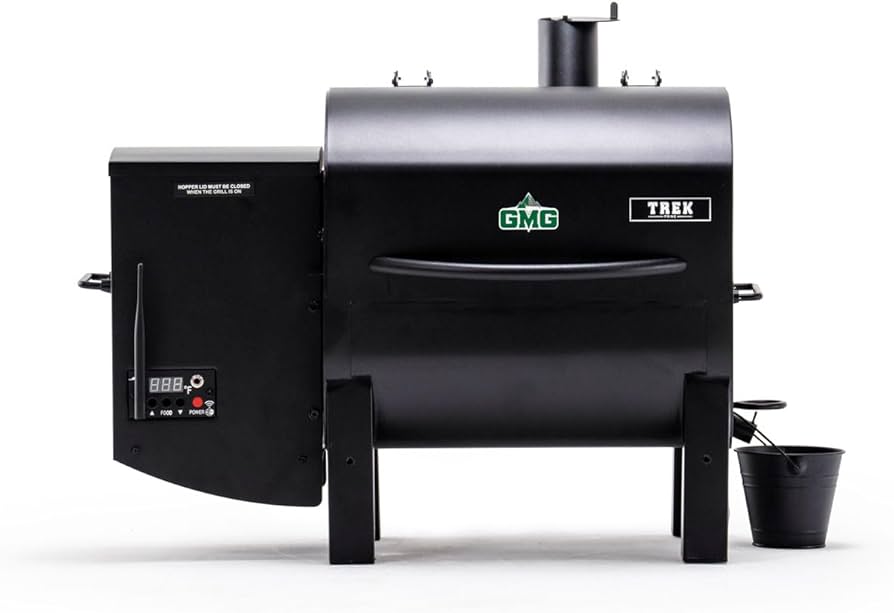
For those who love to grill on the go, a portable pellet grill is a game-changer. In this section of our comprehensive pellet grill comparison chart, we’ll explore the world of portable pellet grills, their benefits, and why they are the perfect companion for your outdoor adventures. We’ll also provide a comparison of some popular portable pellet grill models to help you choose the right one for your on-the-go BBQ needs.
Benefits of Portable Pellet Grills:
- Compact and Lightweight: Portable pellet grills are designed to be compact and lightweight, making them easy to transport, whether you’re camping, tailgating, or simply moving your cooking station around your backyard.
- Versatile Cooking: Despite their small size, portable pellet grills offer versatile cooking options, including smoking, grilling, roasting, and more. You can enjoy the same delicious wood-fired flavor on the go.
- Efficiency: Many portable pellet grills are efficient in their pellet consumption, ensuring you get the most out of your pellets during your outdoor cooking adventures.
- User-Friendly: These grills often come with user-friendly features, such as digital temperature control and Wi-Fi connectivity, ensuring that you can enjoy hassle-free grilling while on the move.
- Quick Setup: Portable pellet grills are designed for quick and easy setup, allowing you to start grilling in no time, whether you’re at a campsite, a picnic, or a sports event.
Comparing Portable Pellet Grills:
In this comparison, we’ll take a look at some popular portable pellet grill models and discuss their key features, advantages, and specifications.
- Green Mountain Grill Davy Crockett: The Davy Crockett is a well-regarded portable pellet grill known for its compact size, digital temperature control, and Wi-Fi connectivity. It’s perfect for those who want a high-quality, on-the-go grilling experience.
- Traeger Ranger: Traeger’s Ranger is another compact and portable pellet grill that offers precise temperature control. It’s an excellent choice for those who appreciate the Traeger brand and want to enjoy wood-fired flavor anywhere.
- REC TEC Grills RT-340: The RT-340 is a compact and efficient portable pellet grill from REC TEC Grills. It’s praised for its durability, precise temperature control, and versatility, making it an ideal companion for outdoor adventures.
- Camp Chef Pursuit: Camp Chef’s Pursuit is a portable pellet grill that offers a generous cooking area for its size. It provides consistent heat and versatile cooking options, making it suitable for various outdoor occasions.
- Weber Traveler: Weber’s Traveler is a compact, foldable, and easy-to-transport pellet grill, making it a convenient choice for those who prefer the Weber brand and its reliability.
Green Mountain Grill: Combining Portability and Performance
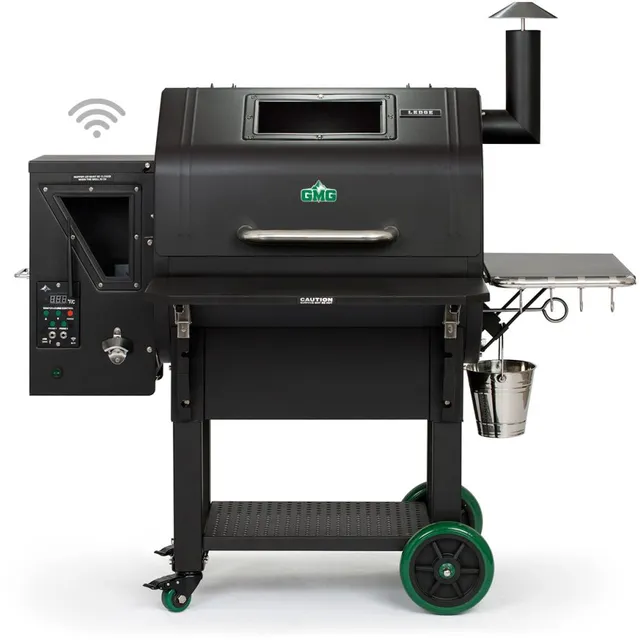
Green Mountain Grill (GMG) is a prominent player in the world of pellet grills, known for combining portability and performance in their grill designs. In this section of our pellet grill comparison chart, we’ll take an in-depth look at Green Mountain Grill, its benefits, and why it’s a favorite choice for many grill enthusiasts. We’ll also compare GMG grills to other popular brands to provide you with valuable insights for your decision-making process.
The Advantages of Green Mountain Grill:
- Portability: Green Mountain Grill offers a range of portable and compact pellet grills, perfect for those who love on-the-go grilling experiences, such as camping and tailgating.
- User-Friendly Design: GMG grills are designed with user-friendliness in mind, featuring digital temperature control, Wi-Fi connectivity, and easy-to-use interfaces.
- Wood-Fired Flavor: GMG grills infuse your food with a delightful wood-fired flavor, allowing you to choose from a variety of wood pellet flavors to customize your dishes.
- Precise Temperature Control: Green Mountain Grill models often come equipped with PID controllers, ensuring precise temperature control and consistent cooking results.
- Efficiency: GMG grills are known for their efficient pellet consumption, making them an economical and eco-friendly choice.
Comparing Green Mountain Grill to Other Brands:
In this comparison, we’ll assess Green Mountain Grill in relation to other popular pellet grill brands, such as Traeger, Pit Boss, and Weber, to provide you with a well-rounded view of your options:
Green Mountain Grill vs. Traeger:
- Portability: GMG specializes in portable grills, while Traeger offers a variety of sizes, including larger grills.
- Wood-Fired Flavor: Both GMG and Traeger are known for their wood-fired flavor, with different wood pellet options.
- User-Friendly Features: GMG grills often come with user-friendly features such as Wi-Fi connectivity, and Traeger offers similar technology for temperature control.
Green Mountain Grill vs. Pit Boss:
- Versatility: Both GMG and Pit Boss offer versatile cooking options, making them suitable for various culinary applications.
- Efficiency: GMG is recognized for efficient pellet consumption, and Pit Boss also offers models with economical fuel usage.
- Portability: GMG excels in portable grills, while Pit Boss has a broader range of sizes, including larger options for more extensive cooking needs.
Green Mountain Grill vs. Weber:
- Wood-Fired Flavor: Both GMG and Weber offer the wood-fired flavor experience that many grill enthusiasts love.
- Quality Construction: Weber is known for its quality construction, while GMG balances quality with affordability.
- User-Friendly Design: Both brands prioritize user-friendly design, offering digital temperature control and other convenient features.
Gas Grill vs. Pellet Grill: A Face-Off
The classic debate of gas grill vs. pellet grill is a common one among outdoor cooking enthusiasts. In this section of our comprehensive pellet grill comparison chart, we’ll compare these two popular grill types, examining their benefits, drawbacks, and what makes each of them unique. Whether you’re a seasoned griller or a beginner, this comparison will help you make an informed choice.
Benefits of Gas Grills:
- Quick and Easy: Gas grills heat up quickly and are ready for cooking in a matter of minutes, making them ideal for spontaneous grilling sessions.
- High Heat: Gas grills can reach high temperatures, making them excellent for searing steaks and achieving that coveted caramelized crust on meats.
- Simple Operation: Gas grills are straightforward to use, with easy-to-understand controls and no learning curve for beginners.
- No Pellet Management: Gas grills don’t require pellet management or frequent pellet refilling, simplifying the grilling process.
Benefits of Pellet Grills:
- Wood-Fired Flavor: Pellet grills infuse your food with a delightful wood-fired flavor, allowing you to choose from a variety of wood pellet flavors to customize your dishes.
- Precise Temperature Control: Pellet grills offer precise temperature control, maintaining the set temperature throughout the cooking process, resulting in consistent cooking results.
- Versatility: Pellet grills are incredibly versatile, offering a wide range of cooking methods, from smoking and roasting to grilling, baking, and searing.
- Convenience: Many pellet grills are equipped with user-friendly features such as digital temperature control and Wi-Fi connectivity, minimizing the need for constant monitoring.
Comparing Gas Grills to Pellet Grills:
In this comparison, we’ll weigh the pros and cons of gas grills against pellet grills to help you make an informed decision based on your cooking preferences:
- Flavor: Gas grills lack the wood-fired flavor that pellet grills provide, offering a milder, more traditional grilled taste.
- Temperature Control: Pellet grills excel in maintaining precise and consistent temperature control, while gas grills require manual adjustments and monitoring.
- Versatility: Pellet grills provide a broader range of cooking options, making them suitable for various dishes, whereas gas grills are typically more limited in their cooking methods.
- Quick Start: Gas grills heat up quickly and are ready for cooking within minutes, while pellet grills require a longer preheat time.
- Searing: Gas grills are better at achieving high temperatures for searing, which is essential for certain grilling techniques.

